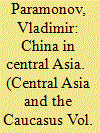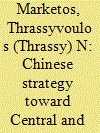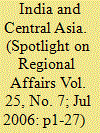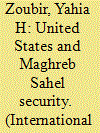|
|
|
Sort Order |
|
|
|
Items / Page
|
|
|
|
|
|
|
| Srl | Item |
| 1 |
ID:
101182


|
|
|
| 2 |
ID:
127575


|
|
|
|
|
| Publication |
2012.
|
| Summary/Abstract |
As China's economy has grown and become integrated into the global market, both have become interdependent. Therefore China's long-term development goals will only be possible with increasing and stable access to foreign trade, resources, and energy. The latter has become a pressing issue as the country's dependence on international energy imports rapidly increases and might impose a limit on its growth if left unmet. This is especially important given supply shortages as a result of the recent events in Libya and given the future prospect of supply disruptions from the Middle East. In the case of oil, the International Energy Agency (IEA) forecast in 2010 that Chinese imports would grow from 4.3 million barrels a day (m/bd) in 2009 to 12.8 m/bd in 2035, thus rising from 53% to 84% of the total demand. The issue of resource shortages will play an even more prominent role in international relations and will become an increasing source of conflict among major powers. Given the fact that some countries are more generously endowed with strategic resources, this opens up the possibility of using these tools for political gain. Historically, economic diplomacy has contributed to the shifting balance of power in the world. Nations have more often been inclined to employ economic measures in pursuit of foreign policy objectives when "the legitimacy of the power of existing structures of international cooperation decreases." The result of the current realignment of geo-economic power will encourage nations to reassess the effectiveness of their energy, economic, and foreign policies.
|
|
|
|
|
|
|
|
|
|
|
|
|
|
|
|
| 3 |
ID:
108043


|
|
|
|
|
| Publication |
2011.
|
| Summary/Abstract |
The geographic proximity of Central Asia to Russia, China, the Caucasus and the Caspian region, as well as to the Middle East, makes this oil and gas-producing region a crucial and ever-developing player in regional and global energy markets. The method by which Central Asian producers choose to develop their hydrocarbon resources and export infrastructure will have significant implications for the plans for diversification of oil and gas supplies of Europe, China and India, as well as for Russia's energy exports to Europe. It is still too early to tell whether the economic and political incentives are strong enough to promote cooperation between the various actors or whether the energy interests of these key external powers are so diverse as to clash in Central Asia.
|
|
|
|
|
|
|
|
|
|
|
|
|
|
|
|
| 4 |
ID:
073099


|
|
|
| 5 |
ID:
091824


|
|
|
|
|
| Publication |
2009.
|
| Summary/Abstract |
Although the Maghreb has never been a priority, it now represents a region of significant interest for the United States. The importance of the Maghreb, and its Sahel extension, springs first from political and economic/energy interests, and second, from military, strategic and security concerns. The first relates to America's energy needs in the region, as well as to the regionalization that could create a potentially lucrative market for US businesses, especially since competition with China has increased over its recent gains in Africa. The second motivation, linked to the first, stems from Washington's new strategy and security policies initiated since 9/11 which have heightened the need for a new type of management concerning security, Islamism, terrorism, and, for a time, democratization. Unquestionably, the problems of terrorism, illegal migration, and other illegal activities are symptoms which cannot be understood if they are disconnected from their causes. However, rather than promoting economic development and good governance, the United States has focused predominantly on hard security matters and established a security system in the region which has continued under the Obama administration. Furthermore, Washington has not so far distanced itself from the regimes in the region whose authoritarianism, mismanagement of the economy, and violation of civil liberties is precisely what brought about the ills from which the Maghreb-Sahel suffers. Without addressing these issues therefore, there is little chance that the region will witness long-lasting peace, security, and prosperity. Furthermore, the protracted conflict in the Western Sahara, the resolution of which has been impeded by the geopolitical considerations of outside powers, has not only hindered the necessary construction of an integrated Maghreb, but also has the potential of leading to regional conflict.
|
|
|
|
|
|
|
|
|
|
|
|
|
|
|
|
|
|
|
|
|